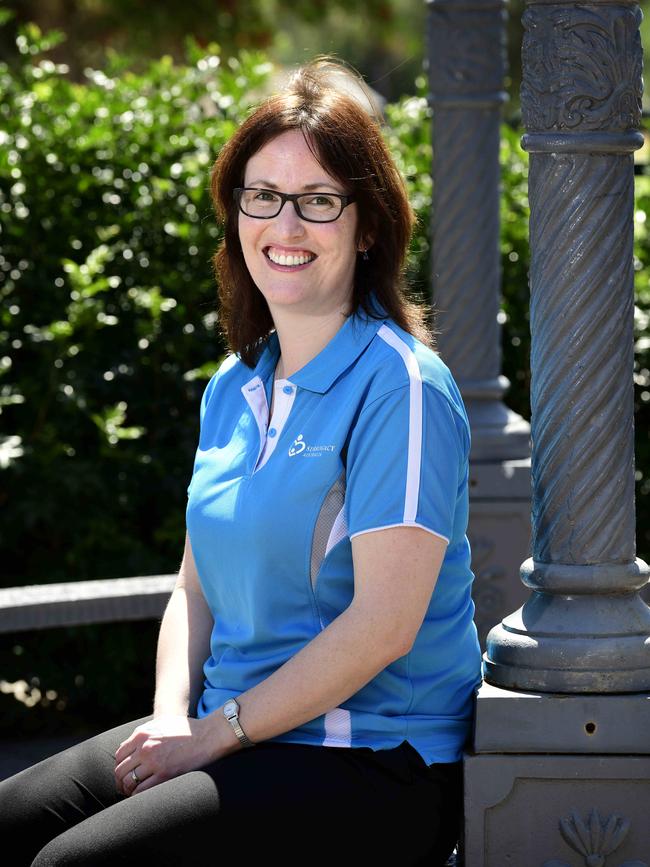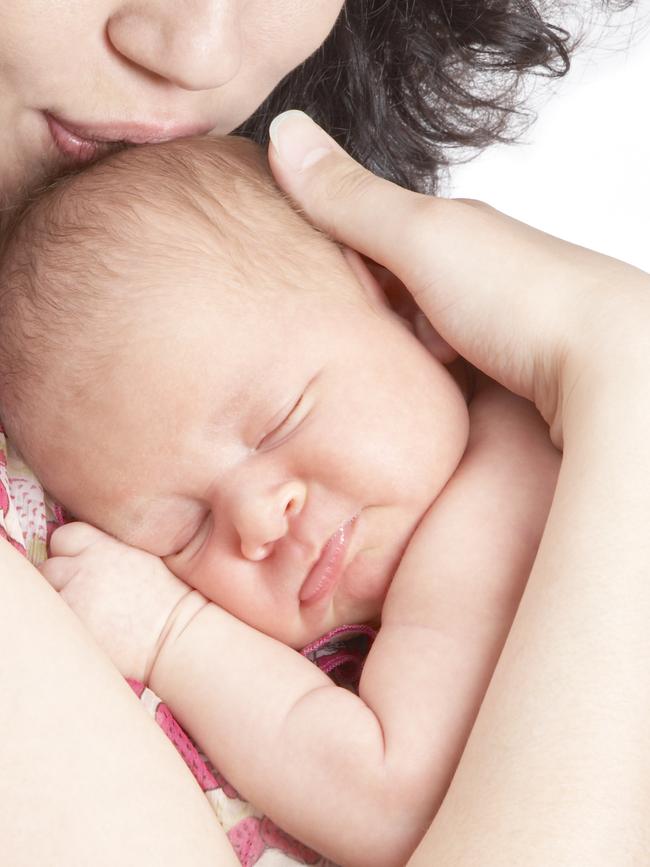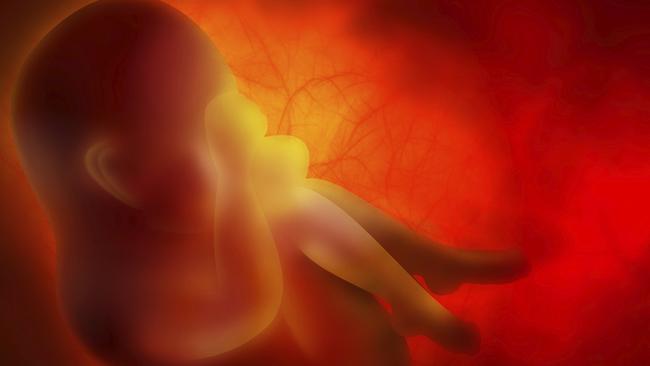Proposed laws to make surrogacy easier in South Australia have been released
The record will finally be set straight on surrogacy – can singles access it, does the mother need her own children ... can the child have multiple parents? All have been answered.
National
Don't miss out on the headlines from National. Followed categories will be added to My News.
Next year, Anna McKie expects to give birth to the third child she has carried in her womb – but the newborn will go home from the hospital with different parents.
The 35-year-old is preparing to be a surrogate mother for two South Australian men who want to have a child.
Having given birth to her daughter and son, now four and two, Ms McKie wants to use her body to give them the “ultimate gift” of parenthood, too.
“Some women want to be surrogates for friends or family,” she said.

“Then there’s women who have this drive to be pregnant and give birth and so we go out to find people who need a surrogate.”
But it can be a complicated process, and SA’s rules around surrogacy have been in limbo for years.
Legislation making unpaid surrogacy easier in South Australia was passed almost three years ago but necessary regulations were never put in place to allow couples to make use of the new arrangements.
Now, finally, a comprehensive review by the SA Law Reform Institute has been delivered to the State Government and proposed laws have been released for public consultation. So what does it mean for prospective parents and the women who want to help them?
ALREADY A MOTHER?
While Ms McKie already has a family, surrogate mothers in SA are not required to have previously given birth to a child.
All of the surrogate mothers that SALRI researchers spoke to for their report had previously carried a pregnancy and given birth to a child of their own and none of those seeking a surrogate had considered a woman that did not already have children.
Many argued that the experience would put surrogates in good stead but researchers ultimately recommended that “a legislative requirement that a surrogate mother should have completed her own family is inappropriate and impracticable”.
INCLUDING SINGLE PARENTS

If you’re a single person in SA, you’re now not allowed to arrange to have a baby through a surrogate at all. In addition to restricting men or women who do not have a partner with whom to make a baby, and who do not want to adopt, this rule has also had an unforeseen and devastating impact on at least one couple.
A 36-year-old man, referred to as J in the report, lost his wife to cancer just days after arranging for her cousin to be their surrogate.
Before her death, they had frozen her eggs but, now left single in the eyes of the law, J was no longer allowed to enter into a surrogacy arrangement.
The reports notes his anger at “the double standards and hypocrisy that if he had passed away, and not his wife, she would have been able to access his genetic material and go ahead and form their family, but he cannot”.
The new Bill scraps any restriction on single people accessing surrogacy.
‘TEAM BABY’
In some surrogacy arrangements, it really can take a village to conceive a child.
The report examines a “team baby” scenario, in which both parents seeking a child by surrogate are unable to provide sperm or eggs to conceive the child. Instead, two separate donors supply the necessary “genetic material” (which could include the surrogate mother’s egg, or another woman’s) and the child who is born has “no genetic link” to the parents who end up caring for them.
While it may sound like a rare set of circumstances, the researchers warn that “given advances in medical technology and the high rate of infertility, this is a real issue”.
The current law is “not entirely clear”, according to their report, but the new Surrogacy Bill put forward by the Government would require that a surrogate child be conceived using “human reproductive material obtained from at least one of the intended parents”.
Ms McKie said this would just put more hurdles in front of people desperately wanting to have a baby. Requirements in other states vary. The SALRI report finds the “concept of ‘team baby’ … is appropriate” if the potential parents are effectively unable to have a child.
“It would also be counter-productive to allow single persons access … but to then deny them access to lawful surrogacy if there is no genetic link between the single intending parent and the child,” it states.

YOUR BABY, MY BODY
While a surrogate mother is carrying a baby for someone else, many expressed the view that new laws should make it clear they had control over their body during the process.
One surrogate reported that her fertility provider had called the couple she was helping directly to reveal her test results and the potential father had answered for her when asked by an obstetrician if she would like to have a scan.
“I don’t want your baby,” she explained “but I make the decisions concerning my body and, as a consequence of it being my body, the pregnancy being entirely mine”. The report recommends a set of clear principles that ensure a surrogate mother “has the same rights to manage her pregnancy and birth as any other pregnant women”.
HOW OLD IS OLD ENOUGH?
Current laws allow SA women to be a surrogate after they turn 18 but many hold concerns that is too young.
In every other jurisdiction except the ACT, the age is 25, and both the SALRI report and draft Bill propose to bring SA into line. “An individual at the age of 18 may lack the maturity to enter something as profound and life-altering as a lawful surrogacy arrangement,” the report says.
Exceptions could be allowed if a counsellor “is satisfied that there are exceptional circumstances”. The proposed new laws do not set a maximum age for surrogates. Internationally, there is no legal age limit in NZ or the UK, while in Canada a surrogate must be at least 21 and in Ireland, they must be between 25 and 47.
TREATMENT OUTSIDE SA
For a surrogacy agreement to be legal, the proposed laws specify the pregnancy must only be conceived using assisted reproductive treatment (not sexual intercourse).
Currently, that fertility treatment can only take place in SA. SALRI deputy director Dr David Plater said the restriction should be removed.
“A high proportion of surrogacy arrangements involve parties from different states,” he said.
“Ultimately we would like to see … uniform legislation which would enable surrogate mothers to assist couples from other states more easily.”
The report recommends people seeking a surrogate should “ordinarily” live in SA but “where the surrogate mother resides and where the fertility treatment occurs should be irrelevant”.
KNOWING WHERE YOU COME FROM
When a child is born through surrogacy now, the surrogate mother is initially named on the birth certificate.
This can later be transferred to the parents who sought the surrogacy through a court order, when the child’s surname is also changed.
The birth certificate should only then refer to the parents caring for the child and not the birth mother, or the fact that there was a change in parents or name. Access to that information is only available to the child once they turn 18.
In updating the law, researchers recommend lowering that age to 16 but also making some reference on the final birth certificate that information is available about the birth mother and any other donors to the pregnancy.
For more information on surrogacy visit surrogacyaustralia.org
To comment on the proposed laws visit yoursay.gov.au
Originally published as Proposed laws to make surrogacy easier in South Australia have been released



